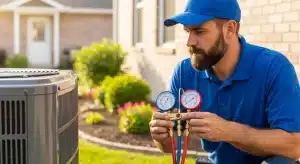
Is your AC blowing hot air when you expect a cool breeze? It’s a common issue that can leave you sweating indoors. From simple thermostat mistakes to serious refrigerant leaks, many factors can cause your air conditioner to not cool properly. In this comprehensive guide, you’ll discover the top reasons behind hot air, step-by-step DIY fixes, preventive AC maintenance tips, and clear signs that it’s time to call for professional help.
Why Is My AC Blowing Hot Air When It’s Supposed to Be Cold?
When your AC is supposed to deliver cold air, but blows warm air instead, it usually points to an imbalance in the cooling cycle. Your system absorbs heat from inside your home and releases it outdoors. Any interruption in this cycle—whether from airflow blockages, low refrigerant, or electrical faults—results in warm air output.
Let’s examine the most common causes:
Thermostat Misconfiguration
Many homeowners overlook simple thermostat errors. If it’s set to “heat” instead of “cool,” or if the fan setting is on “ON” rather than “AUTO,” your AC won’t run through proper cooling cycles. Always verify your thermostat mode before diving into more complex troubleshooting.
Dirty or Clogged Air Filter
A dirty air filter blocks airflow and forces your AC to work harder. Restricted airflow can cause coils to freeze and reduce cooling capacity. Check and replace filters every 1–3 months, especially during heavy-use seasons.
Low Refrigerant Levels
Refrigerant is the coolant that pulls heat from your indoor air. Leaks in coils or lines lower refrigerant levels, preventing proper heat absorption. You might notice hissing sounds, ice build-up on coils, or rising energy bills—clear signs a certified technician should inspect your system.
Frozen or Blocked Evaporator Coils
Poor airflow or low refrigerant can cause evaporator coils to freeze. When ice forms, the coils can’t exchange heat, resulting in only warm air blowing through your vents. To thaw the coils, turn off your AC and let the ice melt completely before restarting.
Poor Airflow from Vents & Ducts
Closed or obstructed vents, dirty ductwork, and malfunctioning blower fans all restrict airflow. Inspect registers to ensure they’re open and clear, and consider professional duct cleaning every 3–5 years to remove dust buildup.
Compressor or Electrical Failures
The compressor pressurizes refrigerant and keeps the cooling cycle running. Electrical components like capacitors and contactors also play vital roles. If you experience frequent breaker trips, strange clicking noises, or burning smells, turn off your system and call for professional service.
What Should I Do If My AC Is Blowing Hot Air? (Quick Fixes)
Step 1: Check & Reset Your Thermostat
Ensure the thermostat is set to “Cool,” the fan is on “Auto,” and the desired temperature is at least two degrees lower than room temperature.
Step 2: Replace or Clean the Air Filter
Slide out the filter and inspect it. Rinse reusable filters with water, or swap out disposable ones. A clean filter restores airflow and efficiency.
Step 3: Clear Debris from the Outdoor Unit
Remove leaves, grass clippings, and dirt from around condenser coils. Use a soft brush to gently clean coil fins without bending them.
Step 4: Flush the Condensate Drain Line
Disconnect the drain line and pour a 1:1 mixture of vinegar and water through it to dissolve algae, mold, and clogs.
Step 5: Inspect for Ice or Refrigerant Leaks
Turn off the AC to thaw any ice. Check coils and lines for frost, oil stains, or hissing noises—symptoms of a refrigerant leak needing professional repair.
When Should I Call a Professional HVAC Technician?
While DIY fixes can solve many issues, certain tasks require a certified expert:
- Refrigerant Recharge & Major Repairs: Only EPA‑certified technicians can handle refrigerant safely. For advanced checks, see our detailed AC troubleshooting guide.
- Gas Leaks & Strange Odors: Rotten‑egg or burning smells mean immediate shutdown. For related airflow problems, check our AC not blowing hard post.
- Compressor & Electrical Failures: Frequent breaker trips, loud grinding, or a unit that keeps freezing indicate deeper issues. Learn more from our AC freeze-up causes article.
How Often Should I Maintain My AC to Prevent Hot Air?
Monthly Filter Inspection
Check filters monthly and replace or clean them every 1–3 months depending on dust levels and pets.
Seasonal Professional Tune‑Ups
Book inspections in spring and fall. Technicians will clean coils, verify refrigerant levels, and test electrical components.
Annual Coil Cleaning
Use a foaming coil cleaner on evaporator and condenser coils to remove built‑up dirt and improve heat exchange.
Install Dehumidifiers & UV‑C Lights
Lower indoor humidity and kill mold and bacteria in ducts for healthier air and peak performance.
Common Mistakes Homeowners Make
Avoid these errors that can worsen AC performance:
- Blocking Vents: Furniture, rugs, or curtains can obstruct airflow. Keep clear space around vents.
- Ignoring Unusual Sounds: Squeals, whistles, or thumps often precede bigger issues—address them early.
- Skipping Annual Checkups: Professional tune‑ups catch hidden problems that DIY checks miss.
- Using Wrong Parts: Always use manufacturer‑recommended filters and replacement components.
Helpful Resources & Further Reading
Need Professional AC Repair?
If you’ve tried these steps and your AC not blowing cold air persists, it’s time for expert help. Schedule AC repair services today to restore cool comfort to your home.



